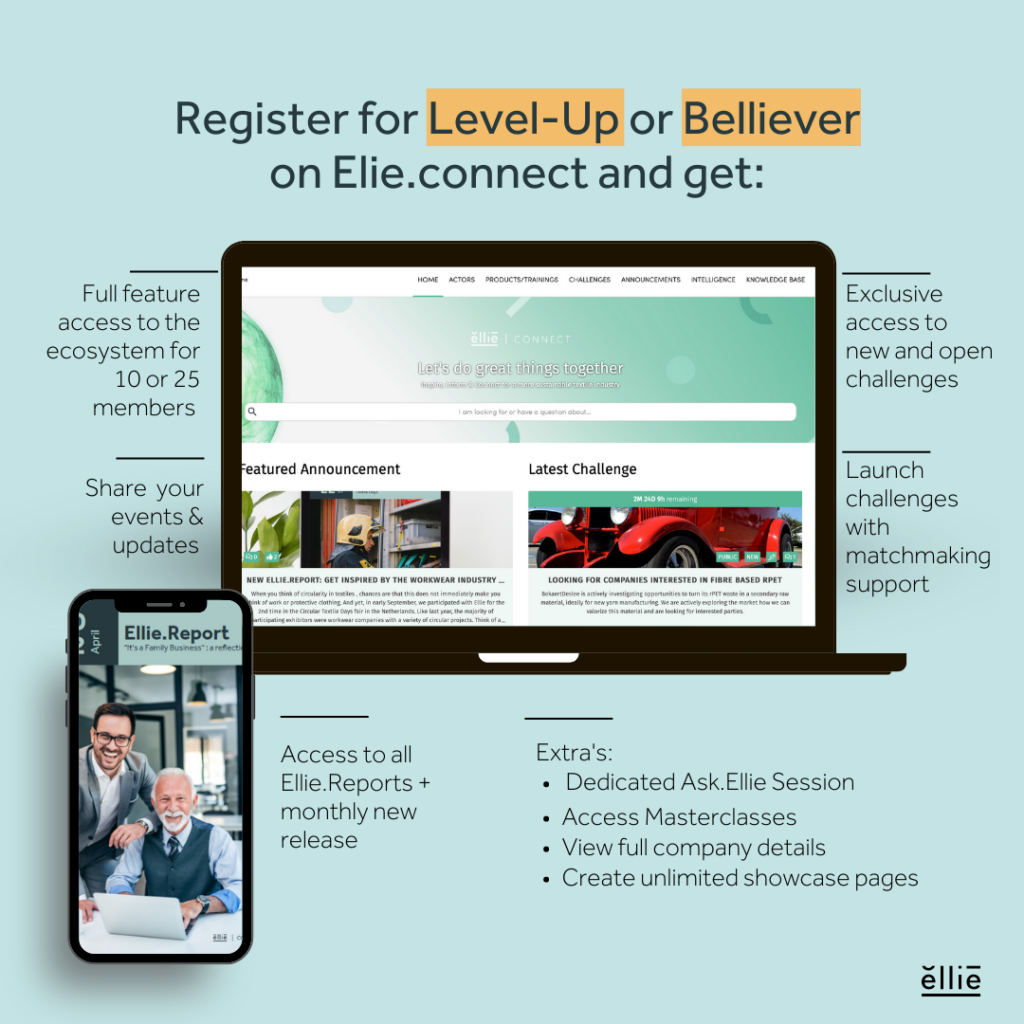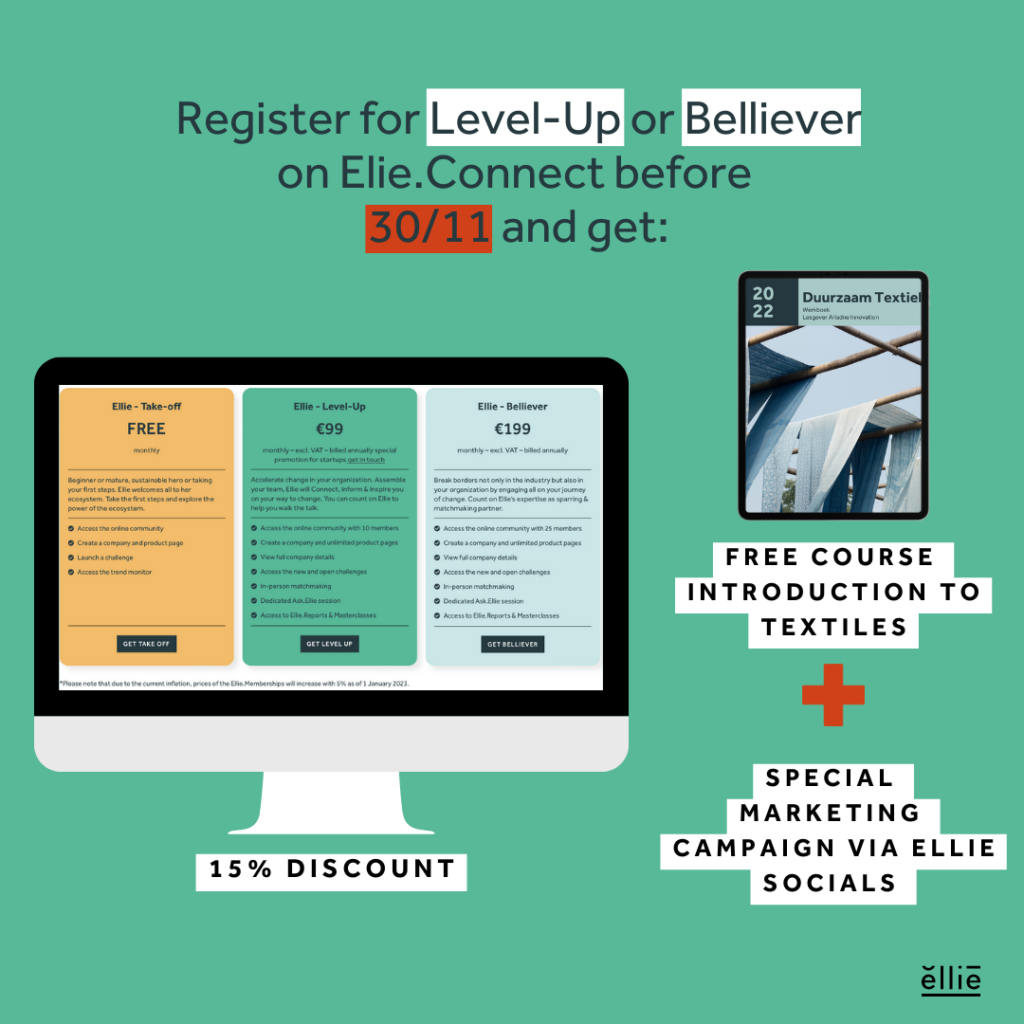Transforming your organization you do not do alone, you need strong partnerships to be successful and to make a real impact.
Ellie.Connect, Ellie’s digital platform, has the mission to unite the industry into 1 ecosystem for change. Ellie.Connect should be the starting point for whoever is looking for connections, inspiration, and information while transforming the organization. It’s your starting point to build partnerships.
But, cross-industry collaboration is not a given word. It’s a verb, not something you do overnight. It requires patience, understanding, and adjustments. In this episode, Julie & Florence, the driving team behind Ellie.Connect, share their 8 tips for building strong partnerships. Tips based, on the learnings from 18 months of building the Ellie.Connect ecosystem. Listen & learn from these lessons learned!
Ready to turn these tips into action? Count on Ellie as your partner for a successful transformation! We've just launched the new Ellie memberships full of value to help you on your journey of change. Everyone registering in November will enjoy a very special promotion! ENJOY IT NOW BECAUSE IT WILL NOT COME BACK!

Listen to the podcast here:
8 tips for partnership building
- Open collaboration requires a change of mindset
- Patience is key
- Go hybrid when building partnerships
- Solutions can come from an unexpected corner
- Create ambassadors for your mission, internally and externally
- Believe in abundance
- Always be transparent
- It’s a bumpy road, always keep your vision in mind
Summary:
1. Open collaboration requires a change of mindset.
Collaboration, everyone knows what it is, but that does not mean that everyone is already in that mindset of open collaboration. This is important to realize in building partnerships, as it can explain why some have a hesitant or even blocking reaction in the beginning.
Florence: with Ellie, our focus is on the digital platform ellieconnect.com, the mission is to break the existing borders, unite the ecosystem and make it easier for companies to find potential new partners, information, or inspiration. If we however look at the ‘standard’ way of how textile companies do this today, it is mostly concentrated around events. There are a lot of dedicated fairs where companies launch their new collections, new trends, etc. In the past, these fairs in combination with the existing network around the company were more than enough, there was not really a need to invest time in the network outside your ‘scope’ or to be very present online.
But if we look at the example of an interior fabric weaver who is thinking about the recyclability of his fabrics, he will need to understand how a recycling company works. These are totally new kinds of connections, requiring new networks, and new kinds of collaborations.
From the start, companies were able to create a company page on Ellie, a very simple page with dedicated parameters so if I would search for a recycler for interior fabrics, in Flanders, I could straight away see the relevant ‘matches’ for this search, and it would save me a lot of time searching. Companies are in full control of the information that they put on it, and it is not at all intended to share IP or secrets. It can be limited to what is found on the website and a classification.
Very simple, and valuable however we did notice that the openness and willingness to create digital visibility like this on a new kind of platform takes time. Just because it requires a different mindset, a different way of working. Today, we still have quite a few members that are exploring the platform and looking a bit around, before they add a profile page.
So even though, you hear everywhere that circularity requires collaboration, we do need to respect that for many this is a change in the current way of working, and that this requires time.
2. Patience is key. Building partnerships, and transforming your business takes time.
Florence : I often remind myself of the quote Jolien Roedolf mentions in the Podcast EP12 on the role of social economy, ‘the grass will not grow faster if you pull it’, a great quote and so so true. Often, when a new challenge gets published, I get very excited and start thinking straight away on all the possible partners that could be a match to the question, I can even drop everything to start notifying them, leaving me waiting for an instant message that a match has been made. Unfortunately, it is not as easy as that. Patience is really key.
3. Hybrid when building partnerships.
Digital has helped all of us in times of covid, and still, now digital meetings are time efficient. With Ellie in the beginning, we also launched with only an online offer, and very very soon we noticed that online is great for having a very broad scope from the start, but your offline meetings create the most impact. It was one the biggest learnings for us, and in our new Ellie memberships launched today, these play an even bigger role than before.
Florence: I also believe that in-person meetings are needed to create trust, trust that you then need to create openness, and willingness to really cooperate. And there is just a lot more energy in the room when you meet in person. A few months ago, we organized the very very first Ellie.Circle event. For this event we brought 5 people literally around the table, to share their challenges and learnings around a certain topic. We made sure to eliminate any boundaries in terms of competition by only taking 1 person per market segment. So we had the wallpaper industry, interior textiles, mattress ticking, knitting, and spinning all around one table, sharing a mutual interest in the topic. I can say that the energy we observed that morning, the openness amongst them, we could have never obtained via a digital meeting.

4. Solutions can come from an unexpected corner.
Sometimes we think we know the answer, or we think there is no answer yet. And exactly at that moment, it is so important to make your challenge tangible – to share it with a broader audience and activate the power of your network. Even though the different segments in the industry are so different, many of the challenges we face are the same. Dare to share your challenges broadly, you might be surprised.
Florence: if I think back, we already had some very nice examples of this. In the very beginning, we supported a project where they were looking for shopping bags made from fabric from recycled denim. Receiving this question, the first thing we did was contact the fashion weavers, but we also published the challenge online to the broad ecosystem. And in the end, we made great shopping bags out of mattress-ticking fabric! It was a perfect fit, but at that time, I would never have thought to contact the mattress ticking weavers! The same is happening for the challenges related to the waste streams, the diversity of potential matches, always surprises me, in a very pleasant way.
5. Tip number 5 is to create ambassadors for your mission, internally and externally.
Creating partnerships, becoming come circular, and transforming your business, should not only involve a few people in your organization. Dare to involve your entire organization in your mission for change.
Florence: there is so much to say about this. I believe the most important part is to really involve your entire organization in your mission, stop with a top-down approach, but really be open to ideas coming from within your organization. I remember this being one of the tips mentioned by Aurelie Maes in Episode 10, as well. And a great example of this is that a few months ago I got contacted by someone. She was responsible for marketing, did not work for that long yet in the company, and was very interested in sustainability herself. From that mindset, she started looking at the production of the company and noticed that there was a quite large waste stream coming from the production tables of still high-quality fabrics but they couldn’t use it anymore in the company. So, her question was if we could find a match via the ecosystem so she could present a concrete case to the managers on how they could recycle these streams. Such a great example of intrapreneurship, and the more people feel involved, the more they will dare to think along and come up with ideas.
6. Our sixth tip is to ‘Believe in abundance’.
There are multiple sayings about ‘You can never have enough….’ But here we mean it in another way.
Florence: Yes, with abundance what we want to say, is that there is no limit on partnerships and as well that you should not limit your partners, always try to see how and with who you can create a win-win. I’d like to refer to what Jan Maes said in Episode 9 when asked if they were not afraid at Revor of competing circular mattresses entering the market. His answer was as well, that the more the better. One of the crucial elements in the circular economy is also customer demand, and the more companies come with a circular offer to the market, the more this market in total can grow. See it as a playing field.

7. Always be transparent.
Should we even elaborate on this one? It should be the foundation of a partnership.
Florence: indeed, transparent relationships are so important, if not, they will not work in the long end. If we look at circularity, for example, we are dealing with completely new business models, so there is no clear framework to start with. If you want to make it work, you need to have regular open dialogues with your partners and be transparent about possible pain points, so you can search for solutions together. Eva from HNST also defines this as a crucial factor in EP8. Because of course, sometimes there will be dirt, but the only to go overcome this is by being open and constructive about it.
8. It’s a bumpy road, always keep your vision in mind.
A very important one, for everyone dealing with change in the industry. There will always be challenges, and the need to adapt the plan, but as long as you keep your vision in mind the way towards it will shape itself.
Florence: indeed, and what I also noticed after the circular textiles days is that everyone is searching, what to do first, who should I work with, and are we doing well enough, .. everyone has questions, and that is ok. Keep your eyes open, listen to the lessons learned from others, and learn by doing. We’re all on this journey together.
Inspired to take action?
Head over to Ellie.Connect and start exploring the ecosystem!

